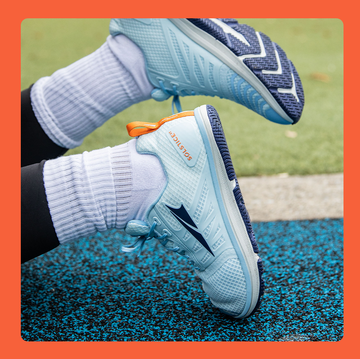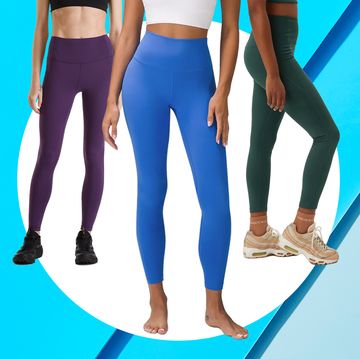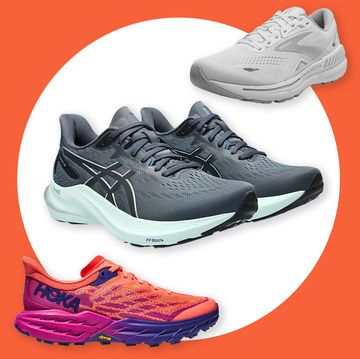Your personal trainer campaigns for quinoa like the grain is running for office. Instagram "fit-celebrities" inundate your feed with gorgeous #TuppLife meal-prep shots. And you swear your cycling class instructor gets a commission from peddling green juice. Today, food and fitness are so inextricably linked, their marriage is even the basis for ABC's My Diet Is Better Than Yours—a reality competition in which fitness pros compete to see whose meal-and-exercise plan helps contestants lose the most weight.
Experts say there are several reasons these two worlds are colliding. One, the fitness arena as a whole is taking a more holistic approach, says Rob Sulaver, a certified strength and conditioning specialist (C.S.C.S.) on the show. "It's imperative that trainers consider the bigger picture—looking at the two as a team, not individuals."
RELATED: 10 Personal Facts About Kayla Itsines That Will Make You Love Her Even More
And with health club memberships at an all-time high—a recent poll found that 55.5 percent of people exercise three times a week (the largest number in seven years of tracking)—many time-pressed clients are turning to trainers and class instructors for nutritional guidance (one-stop shopping!). And of course, social media has afforded fitness pros an open platform to dispense their dietary beliefs like candy, and it's tricky not to gobble it up. Kombucha tea = gut health = flatter abs? Yasss. The only problem? Most of them aren't nutrition experts.
"With all the information—and misinformation—that abounds online, in social feeds, and in gyms, there's a real need for expertise on food and nutrition in promoting health and wellness," says Lynn Cialdella Kam, Ph.D., an assistant professor of nutrition at the School of Medicine at Case Western Reserve University. Indeed. So how do we eat ourselves out of this mess?
RELATED: I Let Google Plan My Workouts for the Week
Degrees of Separation
Even as little as five years ago, most top trainers believed in separation of church and state—or plate, if you will. If clients had dietary questions, they'd refer them to a registered dietitian—or R.D. for short, says Christopher Mohr, Ph.D., R.D., owner of Mohr Results, Inc. A sound approach, considering that the majority of personal trainers "didn't have enough nutrition education to be giving more than general nutrition advice," says Wendy Bazilian, Dr.P.H., R.D., coauthor of Eat Clean, Stay Lean.
Well, guess what? They still don't. Of the hundreds of different fitness certifications out there, very few programs offer nutrition education, aside from some of the most respected: In one of the exams to become a C.S.C.S., trainers-to-be tackle stuff like metabolism and how your body uses food for fuel; and the American Council on Exercise (ACE) and National Academy of Sports Medicine (NASM) tests both cover basic nutrition. Any certification has a "scope of practice" that determines what someone is allowed to advise based on their education and experience. In the case of trainers, it's pretty limited—mostly general tips, like heart-healthy food options, snack ideas, or an explanation of how carbs, proteins, and fats work.
RELATED: 'Biggest Loser' Contestants Drop Bombshell: We Were Encouraged to Take Drugs
Registered dietitians, on the other hand, can make personalized nutrition treatment plans (something called "medical nutrition therapy"). They would be your go-to if you want to lose 10 pounds or follow a food plan during marathon training, or are curious about which foods can help you cope with a chronic disease, says Mohr. These are the experts to hit up for next-level specifics, stuff like supplements or prescriptive details on how to eat to lower your cholesterol.
There's a desperate need for this sort of training, and it's a big reason many experts say the R.D. degree is on the rise—projected to spike 16 percent from 2014 to 2024. Leading fitness organizations (like those certifying agencies we mentioned earlier, as well as major gym chains) are responding to the shift as well, offering more nutrition-specific certification courses and educational seminars to help trainers more accurately advise clients on diet-related queries. Still, they can never truly replace the breadth of knowledge and personalized approach that an R.D. offers: "The same advice can change one person's life and not make a bit of difference in someone else's," says Sulaver. "Nutrition is one of those territories that is so intricate and requires some self-experimentation. We all react to food differently and have to find what works best for us."
A Happier Union
See your trainer as a healthy role model, and take their personal habits or favorite foods as inspiration to make better choices for yourself. Then use these five points to navigate the murky waters of shared opinion.
1. Follow the letters.
First step in spotting a nutrition boss from a wannabe? Look for a few letters that show they've got a creme de la creme nutrition degree: R.D.; certified specialist in sports dietetics (C.S.S.D.); certified clinical nutrition (C.C.N.); or a master's or doctoral degree in nutrition, health education, or allied health services (Ph.D. or Dr.P.H.). They all go through years of schooling and hours and hours of supervised practice and have to keep up their credentials with annual continued education.
RELATED: How to Read a Nutrition Label Like You Actually Know What You're Doing
2. Scan social media.
Check their bio for those letters, as well as for respected institutions they're linked to (top hospitals, universities, or government agencies like the CDC or NIH). Notice how your trainer interacts online too: "You can get a good sense of how authentic they are by watching their engagement with individuals who follow them," says Bazilian. See, for example, if they take the time to answer a random follower's question about added sugars or provide helpful links to more detailed information on the topic.
3. Notice their hashtags.
As with answers to followers, hashtags give insight into the credibility of the "advice" someone is giving on social media. If you see stuff like #spon, #ad, #sponsored, or #giveaway embedded in a sea of hashtags, it doesn't necessarily mean they're peddling BS—it just means there's a professional (and often monetary) relationship that you should keep in mind, says Bazilian. This is particularly crucial with the rise of "influencers"—people often chosen by brands for their big social followings, not necessarily their expertise.
RELATED: 5 Ways Drinking More Water Can Help You Lose Weight
4. Spot a thin skin.
A trustworthy trainer won't be easily insulted if you ask them about their credentials, says Bazilian. "Any good professional shouldn't feel offended that they are being vetted." They also won't pretend to have all the answers—and will be willing to collaborate with other experts if and when they need to.
5. Watch for extremists.
Beware of big statements like "carbs are bad," and steer clear of people who preach their-way-or-else. "Sensationalism may indicate a lack of expertise or professionalism," says Sulaver. "As much as we all wish, there's no proprietary blend that will unlock never-before-seen results."
This article was originally published in the June 2016 issue of Women's Health, on newsstands now.

Cassie Shortsleeve is a skilled freelance journalist with more than a decade of experience reporting for some of the nation's largest print and digital publications, including Women's Health, Parents, What to Expect, The Washington Post, and others. She is also the founder of the digital motherhood support platform Dear Sunday Motherhood and a co-founder of the newsletter Two Truths Motherhood and the maternal rights non-profit Chamber of Mothers. She is a mom to three daughters and lives in the Boston suburbs.













